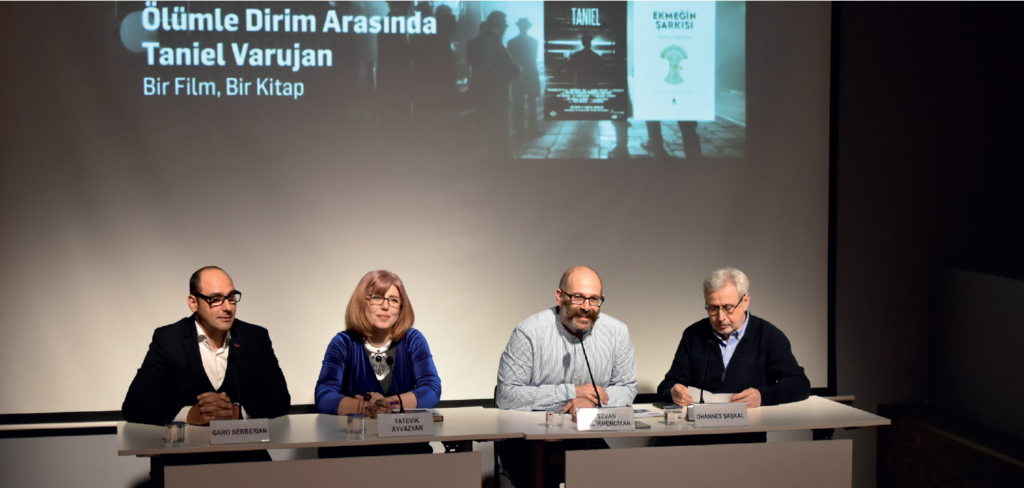Paros Magazine, Istanbul – A Film that Touches Hearts

Istanbul-based PAROS magazine were present at our screening and poetry reading session in Istanbul, at Hrant Dink Foundation. Here is their lovely review below in English translation and Turkish.
Taniel Varoujan is one of the most important names in Armenian literature. The 135th anniversary of his birth was commemorated in Istanbul with the film screening of “Taniel” and a book launch of Hatsin Yerki.
The short film ‘’Taniel’’ was directed by Garo Berberian and its Istanbul premiere was held at the Hrant Dink Foundation’s cinema. In addition, Varoujan’s book Hatsin Yerki (The Song of the Bread) was published for the first time in Turkish by Aras Publications, with a translation by Ohannes Saskal.
The film is about the final days of Taniel Varoujan’s life, who was arrested alongside other intellectuals on April 24 1915. In the film Varoujan poetry gives the poets vision and feelings in each of the scenes and is voiced by young Istanbul based actor Yegya Akgun, new poetry in English was commissioned written by Ben Hodgson that explains the story of the film and is read in the film by acclaimed British actor Sean Bean. The production was shot in Gyumri.
After the screening, Yegya Akgun and Lara Narin performed on stage reading poems and letters dedicated to important moments in Taniel Varoujan’s life, bringing his dramatic words to life and showing their love for each other.
A panel discussion was held afterwards with the film’s director Garo Berberian and poetry producer Tatevik Ayvazyan. Garo Berberian said that he wanted to make a touching film that was not political but humanist, stating that he wanted to reach a non-Armenian audience, he said “We wanted to make this film in Istanbul but a Turkish producer told me it would be impossible. We decided to then shoot in Gyumri because of the locations worked well and the cast there were excellent. We did have to return to Istanbul as we wanted to have Varoujan voiced in Western Armenian, and Yegya Akgun did a wonderful job. This is not only a film project, but also a part of history, and for that reason, it has a lot of emotional meaning for us”.
Sevan Degirmenciyan began by mentioning how difficult it has been to talk about Taniel Varoujan in Istanbul until recently, and due to political pressures his name has not even appeared in textbooks. Varoujan got his education in Mikharist Schools and so studied philology and history, and Degirmenciyan pointed out that “he recreates history through poetic language with literary narration, rather than that of academics and scholars”
Ohannes Saskal, who took two years to translate the book, recalled how Taniel’s poems were rescued after being seized on his arrest in 1915 : “It has been 100 years since they were rescued, it has been 98 years since they were published for the first time but his poems have not lost any of their worth. This shows how great a poet he is.”
“The Song of Bread”
Taniel Varoujan was one of the biggest poets of Armenian Literature before 1915. He monumentalized the life of his people in poetry which reached the peak of literary craft. When he was arrested at his house in Istanbul on the evening of the 24th of April 1915, Hatsin Yerki (The Song of Bread) was his legendary work, composed of his poetic immortalization of his village life with his lyrical style. It was seized by the police at the time of his arrest but was rescued by his wife Araxsi four years later and published in 1921.
Not only does Varoujan write of Armenian farmers and peasants living in Anatolia but he also conveys heart and soul of animals, tools, even dewdrops. Varoujan sings the song of the bread of their life source and recreates their everyday life as if it had never been told before or it would never be again. Published for the first time in Turkish, it is a work of great effort and skilful translation by Ohannes Saskal. The publication by Aras Yayincilik was printed in the same design as the original 1921 version but now in both in Turkish and Armenian.
By Sarkis Gureh | Translated by Şahika Erkonan
